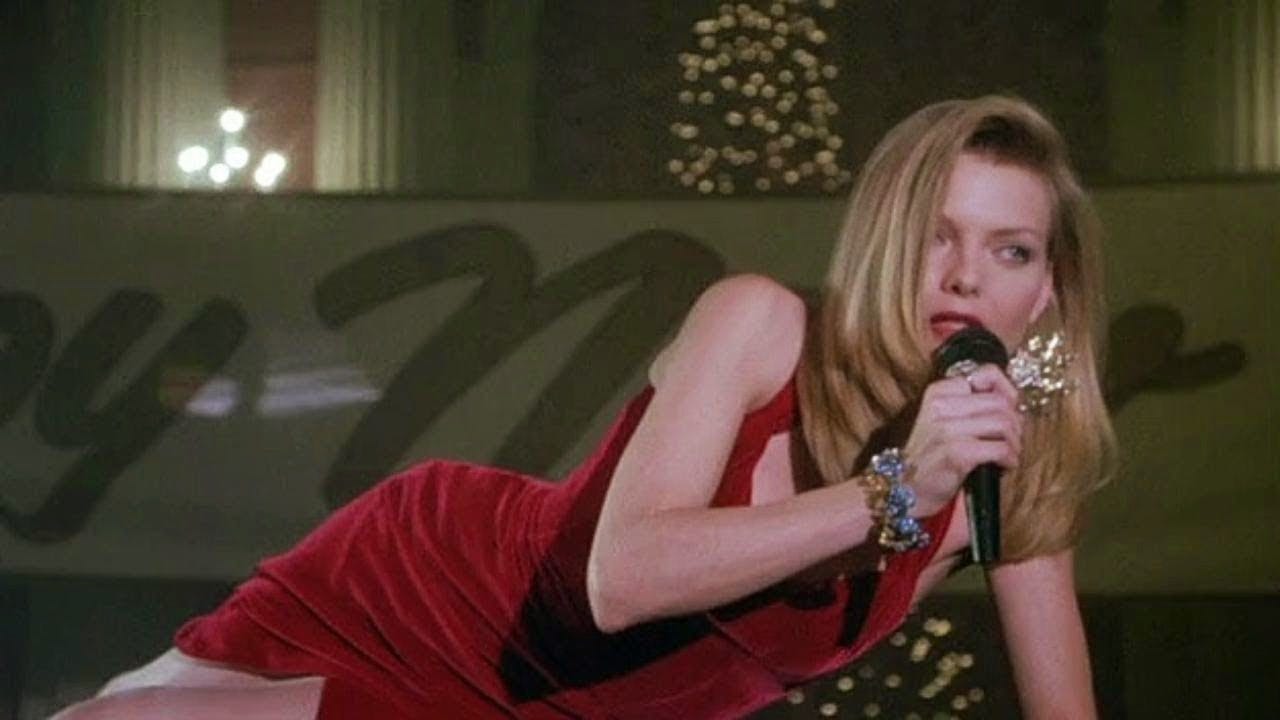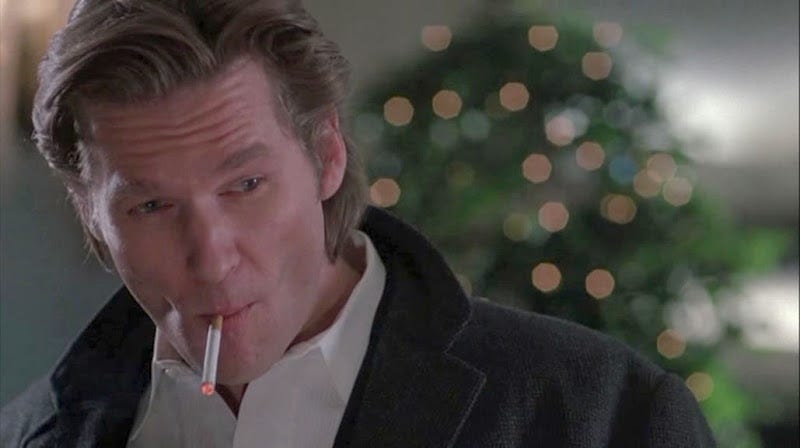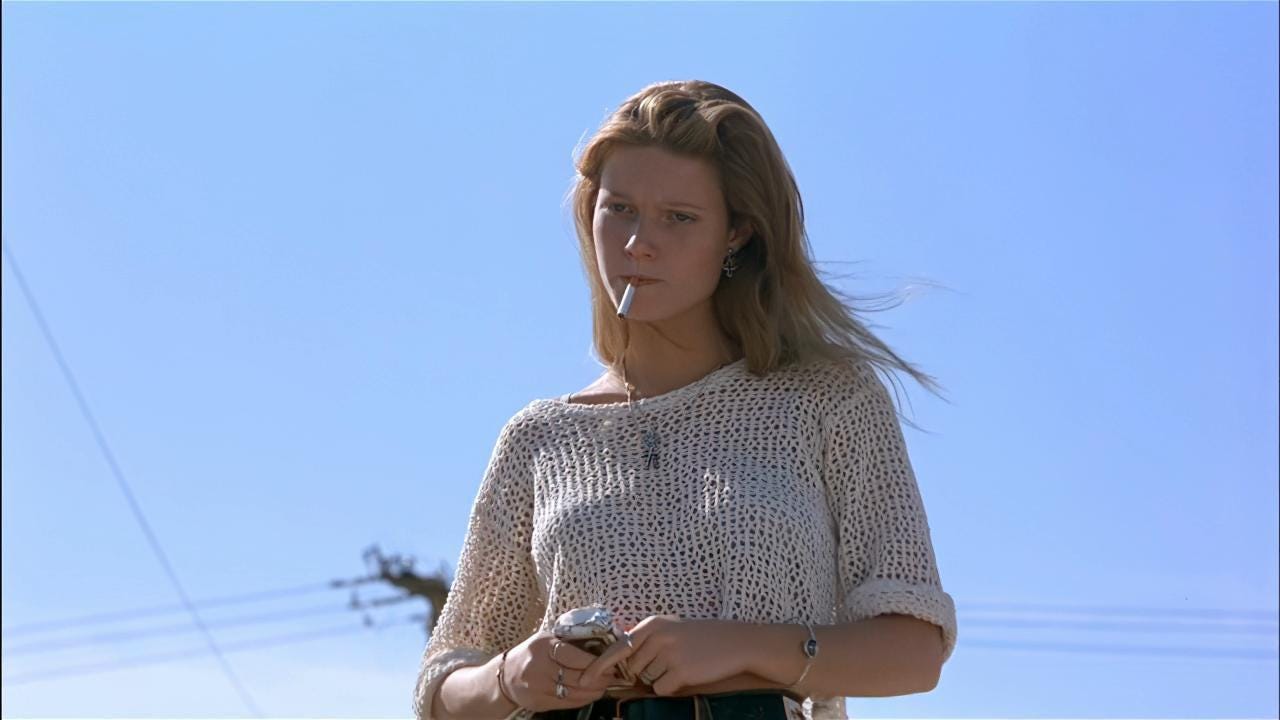The Brief, Promising Directorial Career of Steve Kloves
Steve Kloves is one of the most successful screenwriters of the 21st century. 30 years ago, he stepped away from a more fabulous path.
In The Fabulous Baker Boys, two brothers have spent 15 years taking their dual piano act to the half-filled hotel lounges and noisy tiki bars of Seattle, Washington, scraping together enough money to get by, though the routine has started to get whiskers on it. Frank Baker (Beau Bridges) is the more pragmatic of the two. He takes care of the bookings and presentation, which involves kissing up to odious hotel managers to stay on the calendar, hauling the poster board in the back of his station wagon, and spraying the bald spot at the top of his head. (“It’s not paint. It’s a magical sheath that simulates a dazzling head of hair.”) Eighty-eight keys to his left is his little brother Jack (Jeff Bridges), the musical genius of the pair, who only needs to show up in his rumpled tux and play, which he does with a reliability and spirit that could both be described as “metronomic.” Frank is a conventional family man who drives in from the suburbs, where he’s got children to feed and a mortgage to pay. Jack lives in the city and salves his broken dreams with liquor, cigarettes, and a never-ending succession of cocktail waitresses he burns through as effortlessly as his nightly rendition of “Feelings.”
There’s a little bit of Frank and Jack in Steve Kloves, who wrote and directed The Fabulous Baker Boys as his debut feature in 1989, and would only direct one more movie, the 1993 crime drama Flesh and Bone, before pivoting into a screenwriting career that’s been successful and lucrative—and, to my mind, mostly unworthy of his talent. He got an Oscar nomination for his superb rendering of Michael Chabon’s shaggy-dog comedy Wonder Boys, though he reportedly turned down the opportunity to direct it, leaving it in Curtis Hanson’s capable hands. From there, his gift for adaptation led to a full decade of spearheading the Harry Potter series, scripting all but one of the eight films (Harry Potter and the Order of the Phoenix is the other) inspired by J.K. Rowling’s YA fantasy juggernaut. He was also one of the cooks in the kitchen for the first of Andrew Garfield’s Spider-Man movies and would get a producing credit for the three Fantastic Beasts movies, co-writing the last with Rowling. He’s reportedly at work adapting the T.J. Newman novel Drowning: The Rescue of Flight 1421 for Paul Greengrass to direct. (By some weird Hollywood calculus, audiences have been clamoring since United 93 for Greengrass to take to the skies again.)
To put it as crudely as possible, Kloves was Jack Baker in the 20th century and Frank Baker in the 21st. To put it less crudely, just as Jack and Frank are kin—“flesh and bone,” as James Caan tells his cursed son in that film’s title moment—Kloves surely carries the artist and the pragmatist within him. The man who spent years insisting he direct The Fabulous Baker Boys himself, despite his youth and inexperience, presumably also had bills to pay and a family to support. (His daughter Callie, in fact, would grow up to script Mowgli: Legend of the Jungle.) And perhaps more depressingly, the already-shrinking market for the types of original films that Kloves could write and direct had disappeared, especially after the bruising failure of Flesh and Bone with critics and the general public alike. Produced a full seven years after Flesh and Bone, Wonder Boys seems like a lifeline for a career that had sagged into uncertainty and it was no small feat for Kloves to hold the Harry Potter franchise together on the page.
Only a sicko like me would feel like a promising artist had been waylaid by shepherding one of the most popular franchises in movie history. But The Fabulous Baker Boys, a film remembered most (and not without reason) for Michelle Pfeiffer’s sultry rendition of “Makin’ Whoopie” atop a grand piano, is one of the true studio gems of the ‘90s—soulful, sophisticated, wise, evocative, perfectly cast, and full of dialogue that recalls a time when screenwriting was more literate. Neither The Fabulous Baker Boys nor Flesh and Bone were adapted from novels, but they have the interiority and craft to suggest as much, especially in an era where few screenplays sound like their authors stopped reading books when they no longer had quizzes to take on them. Hollywood lost something when they turned Jack Bakers into Frank Bakers, even if the one thing it didn’t lose was money.
Then again, Frank Baker isn’t a cynical soul in Kloves’ rendering. At this point in their lives, he and his brother may be mercenaries, but they have to make a living at something, and tickling the ivories together for a few days a week has allowed them to carve out some small corner of the entertainment industry. (In one of the film’s many witty exchanges, Frank scolds Pfeiffer’s Susie Diamond when she arrives 90 minutes late to the audition. “Punctuality,” he says. “First rule of show business.” Scanning her dingy surroundings, Susie asks, “This is show business?”) But lately, even the Bakers’ small corner of Seattle is darkening, as bookings dry out even at lounges they’ve haunted for years. (Kudos to Kloves for casting Xander Berkeley, the darkest of character-actor clouds, as a hotel manager who coldly dismisses them with an envelope and an “I’ll call you.”) So Frank smartly proposes taking on a singer to liven up the act.
The audition sequence leads to a funny, if inevitable, montage of 37 tuneless singers strangling the life of popular favorites like “I’m So Excited,” which is to be expected from a pool of local talent willing to work for a 20% cut of chicken scratch the Bakers are drawing every night. But before Susie makes her late, electrifying appearance, Kloves strikes the lovely grace note in casting Jennifer Tilly in a small part as Blanche, a waitress who goes by the stage name “Monica” and offers a rendition of “The Candy Man” in the voice of, well, Jennifer Tilly. (She also attempts to hand Jack the sheet music, which she refers to as “the instructions.”) Tilly’s appearance is a story-within-a-story that’s fleshed out late in the film, when a miserable Jack is the last ticket in her empty diner. The diner has framed photos of the Bakers on the wall, and they really were show business to her. Even Jack, who reflexively attempts to make her another in his dreary line of conquests, has the heart to not let her down a second time.
As for the singer the Bakers actually hire, Susie is a fine creation on the page that Pfeiffer turns galvanizing on the screen. Her jape to Frank about “show business” not only swiftly sizes up the room but sizes up the situation, too. She knows they’re small-time. She knows they haven’t found anyone as good as she is yet. So she doesn’t have to act like Frank is doing her a favor by letting her go through with the audition anyway, despite a résumé that lists “on call for the AAA escort service” under entertainment experience. Susie is brassy yet down-to-earth, quick to recognize the Bakers as a flailing act and to ask for more money and control when she makes them the hottest attraction on the lounge circuit. On stage, Pfeiffer’s breathy voice is perfectly imperfect, nothing you’d hear on a record but paired with her slinky dresses and undeniable charisma, worth far more than a two-drink minimum. Off stage, she’s candid and self-possessed, with just enough vulnerability for Jack to hurt her.
The Bridges boys are also fabulous, to the point where initial casting offers to the Quaids, Dennis and Randy, and then to Jeff Bridges without his big brother Beau are inexplicable in retrospect. You would not immediately recognize them as siblings if they were standing side by side—Frank’s “No, you’re not seeing double” banter to the audience is amusing for that reason alone—but the chemistry between them is unmistakably lived-in, which is perfect for two men who have everything and nothing in common. One of the finer qualities of The Fabulous Baker Boys—and surely the one that kept the film from getting financed for so long—is that it has the integrity to make Jack a jerk, waiting until the last few scenes to give him some path to redemption. Kloves wants us to see what happens to a person whose curdled dreams smell up a room as overpoweringly as Jack’s pack-an-hour cigarette habit. Even the old-fashioned tropes that he’s secretly an okay guy—he loves his dog and provides a safe haven for a lonely, neglected girl who lives upstairs—are more than countered by his sour attitude and the ease with which he sabotages his relationships with Susie and Frank. The only authentic pleasure Jack feels is when he’s performing at an underground jazz club, and Susie, who witnesses it on the sly, throws it back in his face:
“Every time you walk into some shitty daiquiri hut, you're selling yourself on the cheap. Hey, I know all about that. I'd find myself at the end of the night with some creep and tell myself it didn't matter. And you kid yourself that you've got this empty place inside where you can put it all. But you do it long enough and all you are is empty.”
Jack’s snarling response to Susie, “I didn’t know whores were so philosophical,” isn’t the devastating blow he thinks it is. (Her retort is a winner: “At least my brother’s not a pimp.”) He knows she’s telling the truth and it stings. All three of the characters in The Fabulous Baker Boys are at a stage in their life where they’re having to play the cards they’ve been dealt, rather than lamenting a shitty hand. Frank would rather be playing the Starlight for the umpteenth time, but he shrugs it off and says he could “make just as much teaching ‘Camptown Races’ to these snotty kids in the neighborhood.” Susie has a gig singing jingles for cat food and lesser vegetables like carrots and peas. The silver lining for Jack in the end is that he’s starting to see what he has and not what he’s lost. That’s as much of a happy ending as Kloves is willing to supply.
***
Four years later, when Kloves was set to make his follow-up, Flesh and Bone, the commercial headwinds were blowing stronger against him. With a pace, a setting, and burnished visual vocabulary that owes something to The Last Picture Show and In Cold Blood, Kloves tells a crime story that’s more like the slow realization of a family curse, with a father’s sins coming back to haunt a grown son still bruised by trauma. Once again, Kloves had made a movie for a Hollywood that no longer existed, but his conceit is too stubbornly literary, never quite breathing with authentic life. When I first saw the film back in 1994, I was a little bored and disappointed by it, but it’s a little better than I remembered and better than the middling reviews suggested at the time. His care as a screenwriter is still abundantly evident in the stylized neo-noir dialogue and the clean machinations of the plot, which makes the whole film feel inevitable in ways that are both dread-inducing and airless.
The prologue is a killer, however, a multi-generational family tragedy that Kloves lets unfold in agonizing slow motion. On a rural farmstead in Texas, a family gives shelter to a mute little boy who turns up in the front yard, giving him dinner and a bed for the night. When everyone seems to be asleep—mother and father, a son his age, and an infant girl in a crib a few feet away—the boy sneaks downstairs and unlocks the front door, signaling his dad to slip in and burglarize the place. But the man of the house wakes up and grabs the shotgun in his bedroom, and a gunfight ensues, with the intruder killing the parents and their son, leaving the baby to cry helplessly upstairs. She’s a loose end that fate—and no small amount of engineering in the script—will tie up one way or another.
Twenty-five years later, the boy has a name, Arlis Sweeney, and an occupation that suits both his simple-mindedness and the arid purgatory of his adult life. Played by Dennis Quaid, who must have regretted passing on The Fabulous Baker Boys, Arlis travels the dusty backroads of rural Texas to service vending machines, collecting quarters for condoms and candy bars while trucking around with boxes of resupply. At one stop, he experiences the opposite of a meet-cute: A drunk stripper named Kay (Meg Ryan) pops out of a birthday cake at a party and immediately vomits on the yahoo closest to her. Arlis takes pity on Kay and gives her a place to sleep it off. He rescues her a second time when he takes her home and lands in the middle of a marital crisis with her deadbeat husband. So off they go together again and a spark inevitably flies.
Kloves doesn’t try too hard to obscure Kay’s true connection to Arlis, which provides a kind of slow-burning suspense that’s unusual to a film that might be expected to hide the twist. But he’s guilty of exacerbating the extreme unlikelihood of Arlis re-connecting with that crying infant girl as an adult with the extreme unlikelihood of Arlis’ wounded father Roy (James Caan) turning up out of the blue, looking for someone to remove buckshot from his back. Roy still operates as a small-time crook and he’s taken in Ginnie (Gwyneth Paltrow), a nimble-fingered thief, as an apprentice of sorts. When Ginnie isn’t boosting from convenience stores or any other space she enters, she cons her way into funeral spaces and steals from the dead. Roy seems to admire her initiative.
Though all four actors acquit themselves well, it’s the young Paltrow, in an extremely early role, that gives Flesh and Bone a sense of danger and instability that it sorely needs. While Quaid, Ryan, and Caan are all playing characters who are marching inexorably toward a confrontation over two decades in the making, Paltrow is a true wild card, sexy and mischievous yet unpredictable in how she works through this situation. Kloves may be leaning heavily on films like The Last Picture Show and In Cold Blood, but Flesh and Bone is a noir at heart, and it needs to have the urgency that Paltrow provides. (Though it seems likely that Paltrow was destined to stardom one way or another, her performance here led to her scoring the title role in Emma.) Ryan was looking to shake her rom-com reputation by playing a more troubled flibbertigibbet here, but she’d make a deeper impression later in Jane Campion’s 2003 film In the Cut, another film I and many others underrated at the time.
In a long, excellent profile by Michael Sragow in Salon back when Wonder Boys came out, Kloves singles out the 19-year-old Paltrow’s performance, too—“I wish I’d had 120 pages with her,” he notes—but blames himself for losing his nerve and not being truer to his vision of the script. Flesh and Bone was a bitter disappointment and a sad one, too, because his producing partner, Mark Rosenberg, died of a heart attack on location. Kloves stopped writing for three years altogether until his inner Frank Baker, the pragmatist raising a young daughter, led him to clock back in again with Chabon’s novel. And so he turned the page, seemingly putting an end to a promising directorial career that ended 30 years ago, after two good films. On balance, Hollywood is poorer for it.







It is a shame Kloves hasn’t done more directing. I was interested when he opted to pass on “Order of the Phoenix” in order to make his version of Mark Haddon’s “The Curious Incident of the Dog in the Night Time” but regretful it didn’t come to pass. “Baker Boys” and “Flesh and Bone” certainly showed he had the stuff. I always prefer the movies, but as someone else observed maybe Kloves would do wonders with a short series on a streaming service. (Here’s looking at you, A. Cuaron!)
Also, you may see it as wasting talent to work on the Potter series, but I see him as responsible for making it work on film as often as it did. Consider the worst movies in the “Potterverse” were ones he didn’t write. Talk about how a movie is only as good as its script!
It's nice to see you championing Kloves and his skills as a filmmaker. I just got around to seeing Flesh and Bone a couple years ago and I was really blown away by the subtle skill of the writing and filmmaking. It also made me wonder what happened to him. I hope he has the chance to return to filmmaking for himself and see what he can do. Some streamer needs to give him a smart, little show to run.